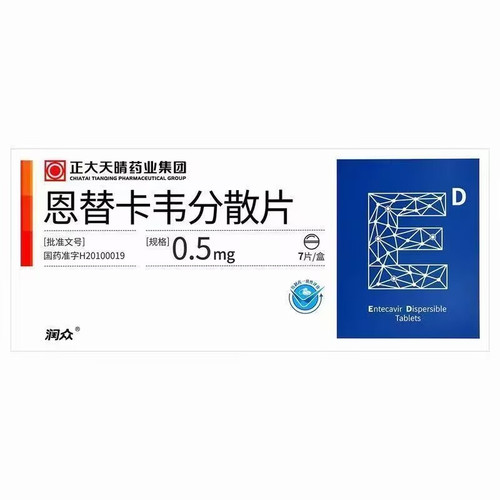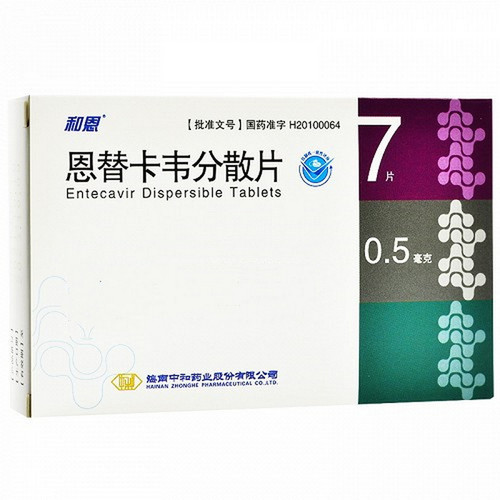Product Overview
[Drug Name]
Generic Name: Entecavir Dispersible Tablets
Trade Name: Leyide Entecavir Dispersible Tablets 0.5mg x 7 tablets
[Main Ingredient]
Entecavir.
[Properties]
This product is white or off-white tablets.
[Indications/Main Functions]
This product is indicated for the treatment of chronic hepatitis B in adults with active viral replication, persistently elevated serum ALT, or active liver histological lesions.
[Specifications]
0.5mg x 7 tablets
[Dosage and Administration]
This product should be taken under the guidance of an experienced physician. Recommended Dose: Adults and adolescents aged 16 years and above should take 0.5mg orally once daily. For patients who develop viremia or develop lamivudine-resistant mutations during lamivudine treatment, take 1mg (two 0.5mg tablets) once daily. This product should be taken on an empty stomach (at least 2 hours before or after a meal).
[Adverse Reactions]
Adverse reactions were evaluated based on four global clinical trials: AI463014, AI463022, AI463026, and AI463027, as well as three clinical trials conducted in China (AI463012, AI463023, and AI463056). A total of 2,596 patients with chronic hepatitis B were enrolled in these seven studies. In studies comparing entecavir to lamivudine, adverse events and laboratory abnormalities were similar between entecavir and lamivudine. In international studies, the most common adverse events with entecavir were headache, fatigue, dizziness, and nausea. Common adverse events in patients treated with lamivudine were headache, fatigue, and dizziness. In these four studies, 1% of entecavir-treated patients and 4% of lamivudine-treated patients discontinued the study due to adverse events and laboratory abnormalities, respectively.
[Contraindications]
Entecavir is contraindicated in patients with a known hypersensitivity to entecavir or any of its ingredients.
[Drug Interactions]
1. Entecavir's metabolism was evaluated in vitro and in vivo. Entecavir is not a substrate, inhibitor, or inducer of the cytochrome P450 (CYP450) enzyme system. At concentrations approximately 10,000 times the human concentration, entecavir did not inhibit any of the major human CYP450 enzymes: 1A2, 2C9, 2C19, 2D6, 3A4, 2B6, and 2E1. At concentrations approximately 340 times the human concentration, entecavir did not induce the following human CYP450 enzymes: 1A2, 2C9, 2C19, 3A4, 3A5, and 2B6. Concomitant administration of drugs that are metabolized by CYP450 inhibitors or inducers did not affect the pharmacokinetics of entecavir. Furthermore, concomitant administration of entecavir did not affect the pharmacokinetics of known CYP substrates. 2. Studies of the interaction between entecavir and lamivudine, adefovir, and tenofovir revealed no changes in the steady-state pharmacokinetics of either entecavir or the interacting drugs. 3. Because entecavir is primarily eliminated through the kidneys, concurrent use of entecavir with drugs that reduce renal function or compete for active glomerular secretion may increase the plasma concentrations of these drugs. Concomitant administration of entecavir with lamivudine, adefovir, and tenofovir does not result in significant drug interactions. Concomitant interactions between entecavir and other drugs that are eliminated through the kidneys or are known to affect renal function have not been studied. Patients should be closely monitored for adverse reactions when taking entecavir concomitantly with such drugs.
[Precautions]
Adjusted entecavir dosage is recommended for patients with renal impairment and creatinine clearance <50 m/min, including those on hemodialysis or CAPD. The safety and efficacy of entecavir in liver transplant recipients is unknown. If a liver transplant recipient is deemed to require entecavir treatment and has been or is currently receiving immunosuppressive medications that may affect renal function, such as cyclosporine or tacrolimus, renal function should be closely monitored before and during entecavir administration. Patient Information: Patients should take entecavir under the guidance of a physician and inform their physician of any new symptoms and concomitant medications. Patients should be informed that discontinuation of the medication may sometimes worsen liver disease, so treatment should be changed under the guidance of a physician. Patients should be tested for HIV antibodies before starting entecavir treatment. Patients should be informed that if they are infected with HIV and are not receiving effective HIV drug treatment, entecavir may increase the chance of developing resistance to HIV drug treatment. Treatment with entecavir does not reduce the risk of HBV transmission through sexual contact or contaminated blood. Therefore, appropriate protective measures are required.
[Pediatric Use]
Safety and efficacy data for this drug in children under 16 years of age have not been established.
[Elderly Use]
Due to insufficient clinical studies involving patients aged 65 years and older, it is unclear whether elderly patients respond differently to this drug compared to younger patients. Other clinical trial reports have not found differences between elderly and younger patients. Entecavir is primarily excreted by the kidneys, and the risk of toxic reactions may be higher in patients with renal impairment. Because elderly patients often have decreased renal function, careful dosing and renal function monitoring are recommended.
[Overdose]
There have been no reports of overdose with this drug. No increase in adverse events has been observed following a single dose of up to 40 mg or multiple doses of 20 mg/day for 14 consecutive days in healthy individuals. If an overdose occurs, monitor the patient for toxicity and administer standard supportive care as needed. After a single dose of 1 mg of entecavir, approximately 13% of the entecavir is eliminated by hemodialysis over 4 hours.
[Pharmacology and Toxicology]
This product is a guanine nucleoside analog that inhibits hepatitis B virus (HBV) polymerase. It is phosphorylated to its active triphosphate, which has an intracellular half-life of 15 hours. By competing with deoxyguanosine triphosphate, the natural substrate of HBV polymerase, entecavir triphosphate inhibits all three activities of the viral polymerase (reverse transcriptase): 1. HBV polymerase initiation; 2. Formation of the negative strand of pregenomic mRNA reverse transcriptase; and 3. HBV DNA positive strand synthesis. Entecavir triphosphate exhibits weak inhibitory activity against cellular α, β, and sDNA polymerases and mitochondrial γDNA polymerase, with Ki values ranging from 18 to greater than 160 μM.








